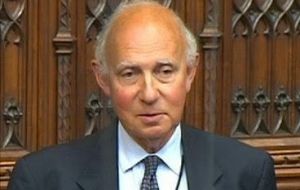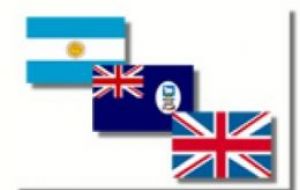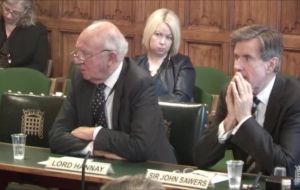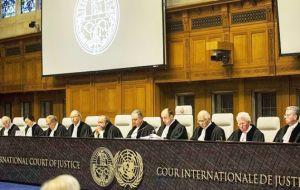MercoPress. South Atlantic News Agency
EU support for Falklands at the UN in doubt, warns ex UK ambassador
 “We could have the same phenomenon if and when the Falklands comes before the United Nations at some stage or other in the future,” Lord Hannay warned.
“We could have the same phenomenon if and when the Falklands comes before the United Nations at some stage or other in the future,” Lord Hannay warned.  Ex UK ambassador at the UN and in Brussels said it had come as a “huge surprise” to Argentina when EU imposed sanctions after its 1982 invasion of the Falklands
Ex UK ambassador at the UN and in Brussels said it had come as a “huge surprise” to Argentina when EU imposed sanctions after its 1982 invasion of the Falklands  “The EU solidarity issue is now, I’m afraid, in play – and I think we will lose it”, Lord Hannay told the Commons Foreign Affairs Committee
“The EU solidarity issue is now, I’m afraid, in play – and I think we will lose it”, Lord Hannay told the Commons Foreign Affairs Committee  The Chagos Islands vote – sending the long-running dispute to the International Court of Justice (ICJ) in The Hague – showed “the way the wind is blowing”
The Chagos Islands vote – sending the long-running dispute to the International Court of Justice (ICJ) in The Hague – showed “the way the wind is blowing” The European Union will refuse to back Britain in United Nations votes over the Falkland Islands after Brexit, a former ambassador has suggested. Other countries regarded the UK’s loss of influence since the Leave vote “as a shark would regard blood in the water”, Lord Hannay told a parliamentary inquiry.
It was laid bare when EU countries helped inflict a humiliating defeat on Britain over the legal status of the Chagos Islands, in a UN vote in June, he told MPs.
“We could have the same phenomenon if and when the Falklands comes before the United Nations at some stage or other in the future,” Lord Hannay warned.
The former UK ambassador at the UN and in Brussels said it had come as a “huge surprise” to Argentina when the EU imposed sanctions after its 1982 invasion of the Falklands Islands.
“They would never have done that if we had not been a member. I don’t believe for one minute they would have done,” Lord Hannay told the Commons Foreign Affairs Committee. “The EU solidarity issue is now, I’m afraid, in play – and I think we will lose it.”
The Chagos Islands vote – sending the long-running dispute to the International Court of Justice (ICJ) in The Hague – showed “the way the wind is blowing”, t warning he diplomat added.
Sir John Sawers, another former UK ambassador before the UN and ex-head of MI6, said: “The standing of the UK has come into question, whether it plays the role in the world that it has traditionally done and which our leaders claim they aspire to.”
Sir John pointed out that, when the UK recently lost its judge on the ICJ bench – for the first time in its 71-year history – a French candidate was successful.
“I think that reflects an admiration for what France has done in 2017, for its new leadership and its centrality in the European Union,” he told the committee. “You can’t say any of those things about the UK.”
Other countries were taken aback by Brexit, he said, adding: “They wonder why Britain has taken this course when it didn’t seem to be one about engagement in the world.”
Theresa May was “respected around the world”, but consumed by the huge task of EU withdrawal. “That means she is not able to play the same international role in the world that, say, the French President has been able to play over the last six months,” Sir John added. “That’s just a statement of reality.”
The Foreign Affairs Committee has launched an inquiry into “the UK’s influence in the UN”, following recent evidence that it is on the wane.
France, Germany, Spain, Denmark, Belgium and the Netherlands were among EU members who abstained in the June vote on the Chagos Islands, a disputed territory in the Indian Ocean.
Chagos Islands occupy a highly strategic location in the heart of the Indian Ocean astride some of the world's busiest shipping lanes. Its sovereignty is also disputed between Britain and the island nation of Mauritius.
In the mid-20th century the islands were depopulated by the British who deported the indigenous Chagossian population at the request of the United States to accommodate the Diego Garcia air and naval base.
In June 2017 major EU member states including Germany, France, Spain and Belgium abstained from a UN vote on whether to refer the question of sovereignty to the International Court of Justice in the Hague. In portent of what may be to come, the EU members' abstentions were crucial in allowing the successful passage of the vote
Last month, the UK was forced to withdraw its candidate to fill a vacancy on the ICJ, because of inevitable defeat in the UN General Assembly.
Lord Hannay said the UK had traditionally been able to influence Washington and shape EU policy at the UN, as a permanent member of the security council. “It goes without saying, I’m afraid, that – since June of last year – those two pillars of our influence at the United Nations has been shaken”




Top Comments
Disclaimer & comment rules-

-

-

Read all comments1973 the UK joined the EU.
Dec 21st, 2017 - 01:30 am +8That's 140 years after Onslow kicked off some trespassers in 1833.
208 years after Byron reasserted Hawkin's claim.
379 years after Hawkins claim for the Maiden Queen.
So remind me, what did the Romans ... sorry, the EU, ever do for us - and please, don't mention the War.
:-)
DT
Dec 21st, 2017 - 09:38 am +6They did - but only with Maggie wielding her handbag. The other members of the EU were most reluctant, particularly Eire and Italy, who both threatened to break the sanctions. It was actually something of a surprise when those sanctions were renewed. But, by the Gods, did they moan.
Willing allies? Not a bit of it.
Told you not to mention the war, now. didn't I?
:-)
EC
Dec 21st, 2017 - 01:00 pm +6“One point BK, - The Scottish Government have a mandate to hold this coming referendum on independence. Thats what they were elected on,”
The SNP won 63 seats of the 129 available. That means 66 seats went to other parties, so that means the SNP are a minority government.
How does this give them a mandate ?
Commenting for this story is now closed.
If you have a Facebook account, become a fan and comment on our Facebook Page!